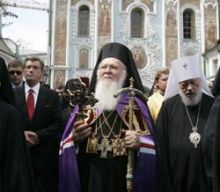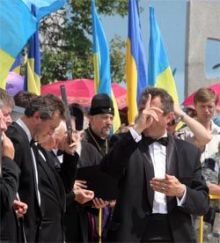What many well-wishers and critics did not believe until the last minute ended up happening: Patriarch Bartholomew I of Constantinople came to ancient Kyiv. He arrived on a Ukraine International Airlines flight and was met according to the protocol established for the visit of the late Pope John Paul II. The patriarch was greeted at the aircraft ramp by beautiful girls dressed in national attire and bearing the traditional greeting of bread and salt. Among those welcoming the guest was President Viktor Yushchenko of Ukraine. In keeping with an ancient Eastern custom, everyone greeted the patriarch by kissing his hand.
In his speech at Boryspil Airport, the Ecumenical Patriarch said that he had come to Ukraine to pray for the establishment of a Single Ukrainian Church and to honor the memory of the Holodomor victims. “We have arrived to pray together with you for the reunification of all of Ukraine’s Orthodox Christians into one church, the church of your people, your country. We have arrived like the angels of peace, unity, and freedom.”
The patriarch thanked President Yushchenko and Patriarch Aleksei II of Moscow and All Russia for “the opportunity to celebrate together the 1,020th anniversary of the baptism of Rus’.” The Constantinople Church “was and still is your Mother, who loves and cares for you,” the patriarch said, adding that he wished to see the Dnipro River, “your Jordan, where your forefathers were baptized.
We have also come to honor the memory of those who were murdered and to bow our heads to the victims of the Holodomor.”
President Yushchenko said that the visit of the Constantinople Patriarch is “a great day for Ukraine and the Ukrainian people: it is a sign of God’s blessing to the entire Ukrainian nation and recognition of its millennium-long achievements,” he said. “We are grateful for your concern and efforts to increase spirituality all over the world. Your pastoral work in the name of peace and justice evokes profound respect.”
Patriarch Bartholomew I of Constantinople and Metropolitan Volodymyr, Primate of the Ukrainian Orthodox Church, offered a joint prayer at the Kyiv Cave Monastery. Bartholomew and Volodymyr exchanged words of greeting and gifts, the President of Ukraine’s press service reported. Taking part in the prayers were President Yushchenko and members of foreign church delegations that had arrived in Ukraine to celebrate the 1,020th anniversary of the baptism of Rus’.
In the afternoon, Patriarch Bartholomew and President Yushchenko laid flowers at the monuments of the Kyivan saints, Princess Olha and Prince Volodymyr, as well as Saints Cyril and Methodius and the Apostle Andrew the First-Called. At 4:30 the president and the patriarch met the heads of the delegations of the Orthodox churches. In the evening there was a solemn service at St. Sophia Cathedral in commemoration of the baptism of Kyivan Rus’.
For some reason, the leadership of the Russian Orthodox Church (ROC) took a rather glum view of the preparations for these solemn and joyous events. Things reached the point that the omnipotent Metropolitan Kirill Gundiaev of Smolensk and Kaliningrad made a flying visit to Kyiv on July 23 to take part in an extraordinary session of the Synod of the Ukrainian Orthodox Church, Moscow Patriarchate (UOC MP). The main goal of Gundiaev’s visit remained unclear - was he “protecting” the Lavra from temptations or was he trying to persuade Metropolitan Mefodii of the Ukrainian Autocephalous Orthodox Church (UAOC) to merge with the ROC? If rumors are anything to go by, the UAOC was invited to come under the Moscow Patriarchate’s jurisdiction on the basis of broad autonomy (“not canonical”) but the metropolitan allegedly turned down the proposal.
In general, the ROC’s upper strata finally bestirred themselves on the eve of the Ecumenical Patriarch’s arrival in Ukraine. Patriarch Aleksei wrote a letter to Patriarch- Catholikos Ilia II of Georgia, asking his Georgian counterpart rather abjectly not to travel to Kyiv to meet Bartholomew. Similar letters were sent to other autocephalous churches. It is not a good thing that some churches cannot resist the omnipotent Patriarch of Moscow.
For example, the small Georgian Church depends on the Moscow Patriarchy in what concerns the very painful and important problems of regulating church problems in Abkhazia and South Ossetia.
Russia’s Ministry of Foreign Affairs also joined the fray: it claims that Ukraine devised all this with the sole aim of splitting the Russian Orthodox Church and the UOC MP (the latter church has really been behaving rather independently in the last while). In Moscow’s view, some forces in Ukraine hope that the Ukrainian Church will either break away from the Moscow Patriarchate and form its own church or will join the Constantinople Church. “There is nothing good here. This will only draw additional lines of division between the Russian and Ukrainian nations,” say people in the know in Moscow (as if all other “lines” are unimportant).
There is one more, hidden, aspect of the history that we are witnessing today: the half-forgotten but recent project in which the Moscow Patriarchate would have loved to participate. The project entailed the marking of the 1,020th anniversary of the baptism of Rus’ by the three “fraternal” peoples of Russia, Ukraine, and Belarus, the second and third participants being, of course, under the omophorion of the Moscow Patriarchate.
But this was a non-starter. The Moscow Patriarch will now have to travel to the not-so-cozy Donbas and conduct a service in the new and still austere Northern Donetsk Lavra under the “omophorion” of Mr. Yanukovych. I think our Kyiv organizers did a good job this time!
Among the positive aspects of this visit are President Yushchenko’s serious attempts to unite the Ukrainian Orthodox community with the aid of the esteemed guest. This is a noble and a very timely task. President has accomplished what seemed impossible by arranging for Patriarch Bartholomew’s visit to Ukraine.
Patriarch Bartholomew, however, has his own patriarchal logic dating back thousands of years.
Another discomforting aspect is the president’s strategy. He appears to be “fighting” for the Local Church having almost no “troops” except his closest functionaries. The Ukrainian Orthodox Church of the Moscow Patriarchate (UOC MP) is still under the aegis of the Moscow Patriarchate while the Kyiv Patriarchate is in a silent background. It is thus not surprising that the result of the event described here remains to be seen. Patriarch Bartholomew left Ukraine on the evening of July 27 without having signed a single document pointing to the beginning of unification between the “branches” of Ukrainian Orthodoxy (even the most inspiring and well chosen words remain words).
Despite all circumstances and innuendos, it should be remembered that Ukraine and the Ukrainian Church have for the first time in their latter-day history celebrated the anniversary of the baptism of Rus’ in Kyiv, not in Moscow (as planned by the Moscow Patriarchate), precisely where this epochal event took place. (Historians insist that the residents of Kyiv and neighboring villages were baptized here around 988, on a territory then known as Kyivan Rus’, including what is today Kyiv, Chernihiv, Zhytomyr, and several other oblasts. Moscow simply did not exist at the time.)
Therefore, all disappointments notwithstanding, the 1020th anniversary of the baptism of Rus’ can be regarded as an extremely significant event in the history of independent Ukraine. Let us hope that it will have far-reaching consequences for the Ukrainian people.








